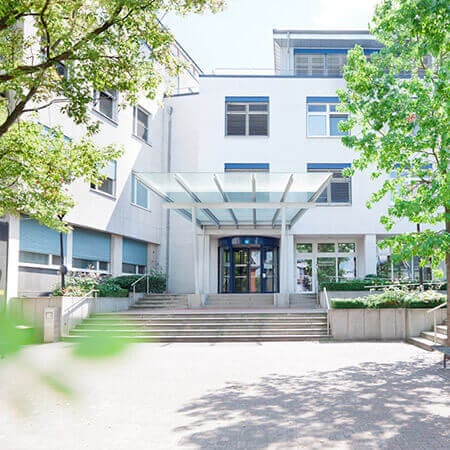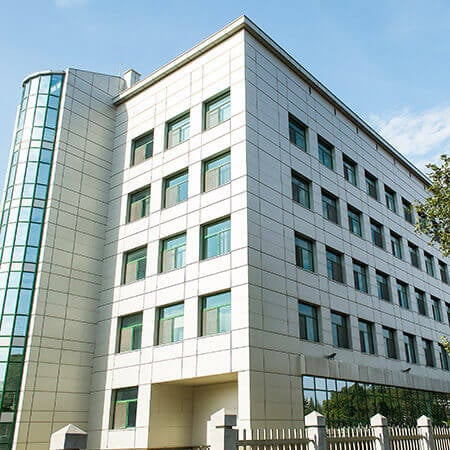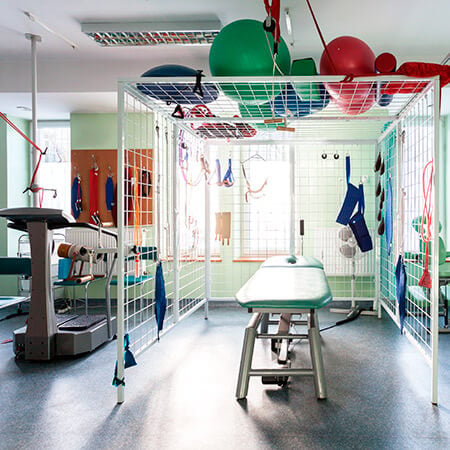Advanced Treatment of Herniated Disc in Germany
A herniated disc, also known as spinal disc herniation, occurs when the inner gel-like core of a spinal disc bulges out through a tear in the outer layer, causing pain and possibly compressing nearby nerves.
Diagnosis typically involves a physical examination and imaging tests such as MRI or CT scans to assess the extent of the herniation and its impact on surrounding structures.
Treatment options include conservative methods like physical therapy, pain management, and anti-inflammatory medications. Surgical options, such as nucleotomy and minimally invasive spine surgery, are available for severe cases.
No, surgery is not always required. Many cases of herniated disc can be managed with conservative treatments. Surgery is typically considered when conservative methods fail to relieve symptoms.
Recovery time varies, but patients generally stay in the hospital for a few days and can return to non-physical work within a few weeks. Full recovery, including physical activities, may take several months.
A herniated disc (spinal disc herniation) is a spine pathology which mainly occurs in middle-aged people. Intervertebral discs contribute to the spine’s stability and mobility: they absorb concussions during movement and protect the vertebrae from an excessive load. In addition, intervertebral discs preserve the normal functioning of the nerves that originate from the spinal cord and are located between the vertebrae.
When a hernia arises, the disc loses its protective and supportive function. Neighboring vertebrae start suffering from mechanical friction during movements. The intervertebral nerves may also be compressed. The disease manifests itself with pain syndrome or movement disorders. This is one of the most common causes of back pain.
The Booking Health portal presents 73 German clinics specializing in herniated disc (spinal disc herniation) treatment
Show all clinics
Diagnostics of a Herniated disc (spinal disc herniation)
An MRI (magnetic resonance imaging) scan is the best diagnostic method in a case of a herniated disc. CT (computed tomography) scans and myelography are also used for diagnostics. German spine specialists are adept at quickly identifying the signs of herniated discs in the cervical, thoracic, or lumbar regions, distinguishing between bulging and fully herniated discs, and determining whether the condition requires emergency intervention or can be managed with conservative treatments.
Best clinics for herniated disc (spinal disc herniation) diagnostics in Germany:
Treatment of a Herniated disc (spinal disc herniation)
All treatment methods, except the surgical ones, are aimed at the elimination of the disease’s symptoms. The following techniques are used:
- medicamentous treatment – painkillers and muscle relaxants help to relieve muscle spasm;
- massage, manual therapy, physiotherapy, traction (stretching) of the spine, and other physical methods are aimed at the decompression (extrication) of the spinal nerve root;
- blocks with local anesthetics and glucocorticoids allow doctors to reduce the pain for some time due to the cessation of the impulse passage through the corresponding nerve;
- therapeutic exercises, corsets, posture correction, and weight loss help to unload the spine and decrease the degree of the nerve roots’ compression;
- laser hernia removal. The evaporation of the protrusion by a laser beam is carried out. This technique is effective only at the stage of protrusion, when the nerve roots are not pinched. Therefore, it is rarely used.
It is possible to achieve compensation for a disease in most patients, using the conservative treatment methods. Surgery is indicated for other patients. It is carried out in the following cases:
- severe pain syndrome;
- inefficiency of conservative treatment within 6 weeks;
- cauda equina syndrome;
- paralysis and disorders of pelvic organ functions.
The following types of surgeries are performed:
Microdiscectomy. A fragment of the intervertebral disc is removed together with the herniation. Currently, microdiscectomy is considered to be the “gold standard” for surgical treatment of a herniated disc.
Endoscopic nucleotomy. An alternative to microdiscectomy in cases of small hernias. This is a high-tech procedure, which is performed endoscopically and does not even require the hospitalization of a patient. It is almost as effective as microdiscectomy, but this technique causes more relapses. The advantage is a low risk of complications compared with open surgery.
Discectomy with intervertebral disc prosthesis. The intervertebral disc is removed and replaced with an artificial one. This surgery excludes any risk of relapse. A hernia may only appear in another part of the spine in the future. The patient’s mobility is completely preserved after the implantation of the prosthesis.
Herniated discs can be post-traumatic. They are caused by trauma, including sports injuries. As a result of sports injuries, the fibrous membrane is torn in a patient, and part of the nucleus pulposus protrudes, putting pressure on the nerve structures. The result is low back pain. After sports injuries, hernias may appear not only at one level, but at two to three levels at once. The therapy tactics depend on the intensity of the low back pain, and the size and number of hernias. Whenever possible, conservative therapy is carried out: painkillers, physiotherapy, massage, and blocks. If there is no sufficient effect of therapy for several months, the hernia is removed surgically.
Best clinics for herniated disc (spinal disc herniation) treatment in Germany:

Charite University Hospital Berlin
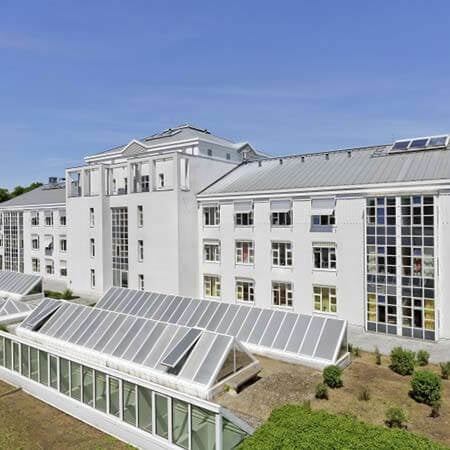
Vivantes Auguste-Viktoria Hospital Berlin
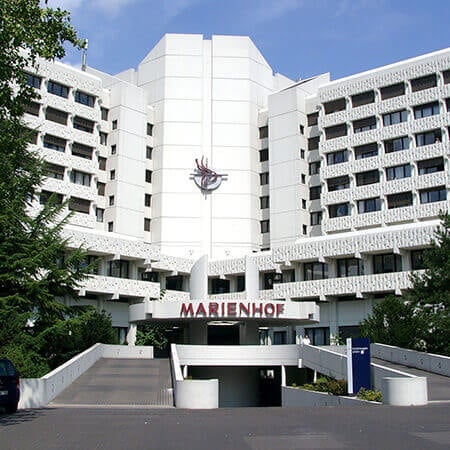
Catholic Clinic Koblenz-Montabaur
Rehabilitation after treatment of a Herniated disc (spinal disc herniation)
The most modern rehabilitation programs are used in Germany. They are adapted individually for each patient, and are based on the disease’s stage, patient’s age and physical possibilities, and the results of treatment. Different specialists, such as: therapists, neurologists, psychologists, rehabilitators, kinesiotherapists, and physiotherapists are involved in the rehabilitation process.
The following methods of rehabilitation are used:
- dosed physical activity;
- training on the simulators and in the pool;
- individual orthoses;
- physiotherapy;
- acupuncture;
- manual therapy;
- transcranial magnetic stimulation;
- natural factors of nature (mud, thermal waters, etc.);
- individual or group therapy with a psychologist.
Rehabilitation may include medicamentous support. It is necessary to hold a consultation with the patient about the proper nutrition and the way of life which is important for him in his current situation.
Rehabilitation programs in Germany are designed to last for 2 weeks. If necessary, they can last much longer. In this country, the patient is provided with qualitative care, accommodation in comfortable rooms, and individually selected meals.
Rehabilitation programs in Germany show some of the best results in the world. Most patients successfully restore their working capacity and excellent health there. They remain physically active, and return to their full social and family life.
Best clinics for neurological rehabilitation in Germany:
Author:
The article was edited by medical expert, board certified Dr. Nadezhda Ivanisova. For the treatment of the conditions referred to in the article you must consult a doctor; the information in the article is not intended for self-medication!
Sources:
National Spine Health Foundation
The cost of services includes
Here you can find the cost of treatment for this disease at the German University Hospitals. Leave a request and we will provide a free consultation with a doctor and will start organizing the whole treatment process.
The program includes the following:
- Issuing of an invitation for getting a visa for treatment as quick as possible
- Fixing an appointment at a time convenient for you
- Preliminary organization of a comprehensive examination and discussion of the forthcoming treatment plan
- Arranging transfer from the airport to the hospital and back to the airport
- Provision of interpreting services and services of a personal medical coordinator
- If necessary, assistance in the organization of further surgical treatment
- Provision of a medical insurance against treatment complications covering up to 200,000 euro
- Preparation and translation of medical records and recommendations from the hospital
- Assistance in the subsequent communication with your attending physician, including consultations on repeated X-ray images through the unique medical document management system E-doc
